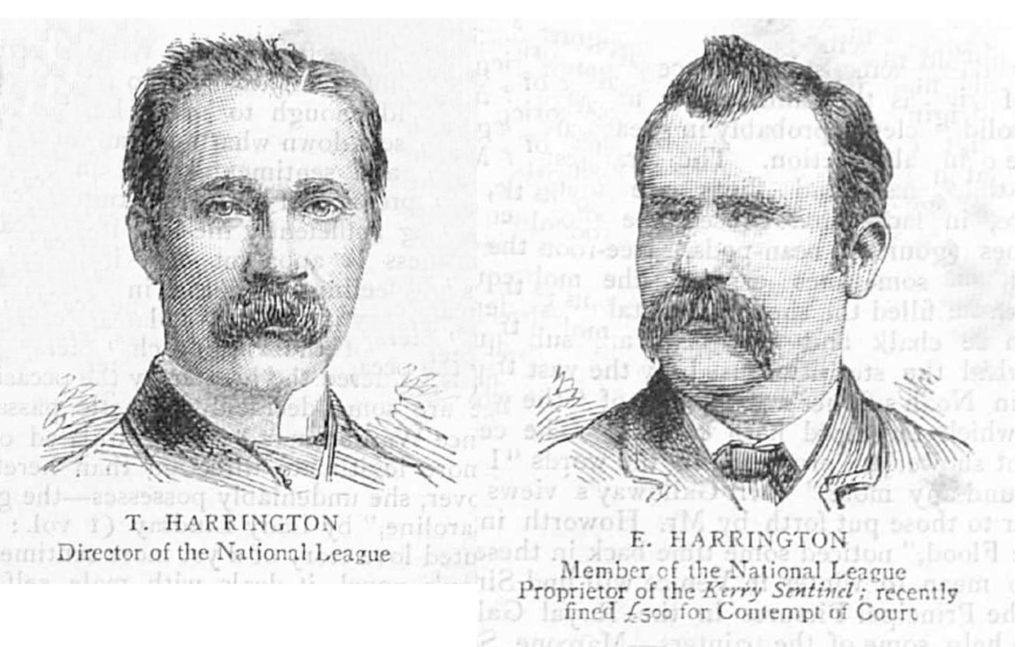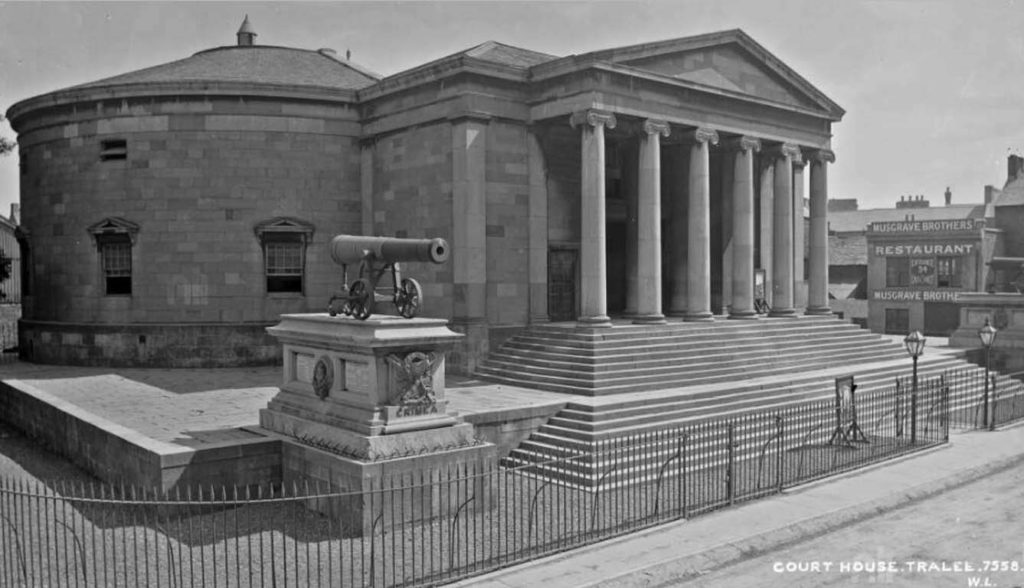Murder never goes unavenged, the blood of the murdered cries to Heaven for vengeance – George Raymond, BL, for Mrs Browne
About one week before William Marwood, the executioner, arrived in Tralee to begin erecting the gallows on which Sylvester Poff and James Barrett would die, two appeals were submitted to the Lord Lieutenant of Ireland.
The first was for the reprieve of Poff and Barrett, engineered by their solicitor, Maurice J Horgan, Tralee.1 The second was for compensation under the Prevention of Crime (Ireland) Act 1882, made by Johanna, Thomas Browne’s widow, for the murder of her husband on 3 October 1882.2
It was exceptionally bad timing that Mrs Browne’s case coincided with public pleas for the lives of Poff and Barrett.3
It was tragic, too, for it contained information about motive not revealed at the two trials, information which would almost certainly have exonerated Poff and Barrett.4
The absence of Timothy Harrington, the fearless editor of The Kerry Sentinel, on whom the information might not have been lost, further compounded affairs. But at that very time, he was on trial in Mullingar on charges under the Prevention of Crime Act.5

Mrs Browne’s case came on in Tralee Courthouse on Wednesday morning, 10 January 1883. She was represented by barrister, George Raymond, instructed by solicitor, Mr F C Downing.
Mr Raymond, BL, first sought to clarify that the late Thomas Browne was not ‘the long descended Lord of broad acres’ but a peasant proprietor, not created by act of parliament but ‘by the sweat of his brow.’ He was of humble origin – a man of temperance, sobriety, religion and piety, who was kind, hardworking, and charitable:
Among the last acts of his life was to go with the priest of his parish to make arrangements for rebuilding the chapel which had been blown down by the storm which had occurred a few days before.
The barrister went on to outline Browne’s ambition to become the proprietor of his own land. A farm was held at Dromultan by three brothers, Edmond, John and James Fitzgerald, by lease, at a rent of £120 per annum for 31 years, under Robert Daniel Fitzgerald.
Twenty years earlier, Browne’s father had purchased the interest of Edmond Fitzgerald, one of the three brothers, for a three figure sum subject to one-third of the rent, or £40 per annum. Upon the marriage of his son, Thomas, Mr Browne senior gave him the farm, getting the fortune of the girl which was £100. Thomas Browne subsequently worked and lived on the farm, aided by the industry of his wife.

The landlord later decided to leave the country and dispose of his interest which provided Thomas Browne with the opportunity to realise his ambition. He became the purchaser in August 1878 for the sum of £1,600, subject to a fee farm rent of £35. Browne borrowed some of the money from his friends and relations and was working hard to gradually pay off the debt at the time of his murder.
The lease under which the Fitzgeralds, his co-tenants, held, was due to expire in March 1883. The barrister then made an astonishing statement:
Browne expected when making this purchase that on the expiration of the lease he could get the land into his own occupation. To this his death is attributed … A decree for his death had gone forth from some dark tribunal.6
Thus transformed rumour to record: the murder of Thomas Browne was over land – land which had no bearing whatsoever on Sylvester Poff or James Barrett.
In another column of the day’s news, the Memorial to His Excellency, John Poyntz, got up by supporters of Poff and Barrett, appeared. It urged the Lord Lieutenant to consider the ‘strong feeling in the neighbourhood of the scene of the murder and in the surrounding country that the prisoners were not the perpetrators of the murder’:
Sylvester Poff and James Barrett, convicted at the Munster Winter Assizes at Cork of the murder of Thomas Browne, at Dromultin, in this county, now lie under sentence of death in the county gaol at Tralee, such sentence being ordered to be carried out on Tuesday, 23rd January. That the prisoner Sylvester Poff is a married man having a wife and four children besides an aged mother entirely dependent on him for their maintenance. That the prisoner James Barrett is a young man under 20 years of age and is the eldest son of respectable parents of the farming class who have, besides the prisoner, a large and helpless young family – the prisoner being the only member of it able to render his father any assistance in the management of his farm. That both prisoners have hitherto borne most exceptional characters. That there is a strong feeling in the neighbourhood of the scene of the murder and in the surrounding country that the prisoners were not the perpetrators of the murder, and we feel that the commutation of the sentence on the condemned men will do more to promote peace and restore the neighbourhood and the country generally to tranquillity and order than if the capital sentence be carried out. Memorialists, therefore, humbly pray that your Excellency will exercise your high prerogative in commuting the sentence on these unhappy men and thus spare our country the disgrace of having an execution carried out where such has been unknown for a period of thirty years; and memorialists will ever pray. John Kelly, Chairman, Tralee Board of Guardians M P Kearney Maurice Brick And on behalf of the Board of Guardians of Tralee Union.
It might be asked if Poff and Barrett were ‘hired assassins’. No, they had heard rumour of ‘bad work’ themselves, from Dunleavy. They spent the day going about their business. They unwittingly left a busy public house shortly before the murder and wandered dangerously close to its path.
The Crown, with the help of Bridget Brosnan and two trials, tried to fit Poff and Barrett to the crime and, unimaginably for the men, succeeded.
_____________
1 Further reference, see page ‘Poff and Barrett: Final Hours’ on the O’Donohoe website. 2 The Lord Lieutenant appointed investigating barrister David Lynch to deal with the applications which were heard in Tralee Courthouse. Five applications in total were heard in Tralee, including that of Mrs Wilhelmina Herbert for the murder of her son, Arthur Edward Herbert, JP, heard on Monday 8 January. The other three cases were heard on Tuesday 9 January, viz Patrick Farry, RIC, Coote Hall, Co Roscommon, injuries received on 16 December 1880 at Cordal, Co Kerry; John Nolan, RIC, Hackett’s Terrace, Cork, injuries received on 10 October 1880 at Ballyduff, Co Kerry; Cornelius Leary, Reenasup, Co Kerry injuries received on 15 March 1882. Mrs Browne’s case was heard on Wednesday 10 January 1883. 3 Mrs Browne’s claim for compensation was first made on 18 November 1882. 4 Only one report of the hearing can currently be found, published in the Kerry Evening Post, 13 January 1883. 5 Timothy Harrington MP was released from Galway prison on Monday 16 April 1883 after two months imprisonment. For further reference to Timothy Harrington, see page, ‘Stop Press: Michael O’Donohoe and the Kerry Newspapers’ on the O’Donohoe website. 6 Kerry Evening Post, 13 January 1883. Evidence was gone into in support of the claim. Mrs Browne (widow), Mr Davis, Dr Harold, J Kerin, father of Mrs Browne, and a brother of Thomas Browne were examined, but no report of those examinations was published. Johanna Browne was subsequently awarded £800.


